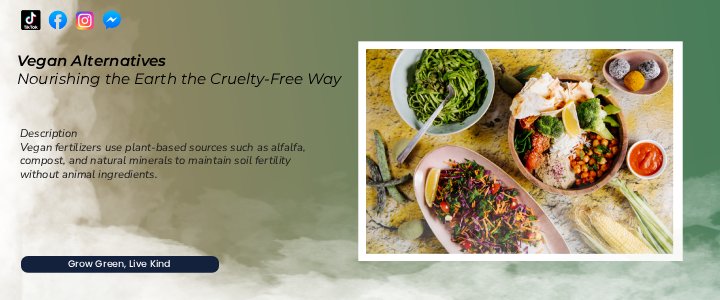Rethinking Soil Fertility the Vegan Way
When it comes to soil health, many traditional farming methods rely heavily on bone meal and animal manure. While these inputs are nutrient-rich, they raise ethical, environmental, and sometimes even safety concerns. This is where vegan alternatives come in—plant-based soil amendments that provide essential nutrients without relying on animal byproducts.
Vegan alternatives are not only suitable for those practicing vegan organic farming, but they also align with the growing demand for sustainable and cruelty-free agriculture. By shifting to plant-based fertilizers like compost, green manure, and biochar, farmers and gardeners can maintain healthy, productive soil while reducing reliance on industrial livestock systems.
Why Choose Vegan Alternatives?
Adopting vegan alternatives to traditional fertilizers offers multiple benefits:
- Ethical farming practices without the use of animal byproducts.
- Lower environmental footprint, reducing greenhouse gas emissions from animal waste.
- Safer soils with less risk of contaminants linked to industrial farming.
- Sustainable nutrient cycling that works in harmony with natural ecosystems.
These advantages show that vegan alternatives are not just about ethics but also about long-term soil and crop health.
Plant-Based Options for Soil Fertility
To build strong and fertile soil, vegan alternatives provide a variety of nutrient sources. Each has its own benefits and applications.
Compost
Compost is one of the most accessible and effective vegan alternatives. Made from decomposed organic matter such as kitchen scraps, leaves, and plant clippings, compost enriches the soil with a balanced mix of nutrients. It also improves soil structure, water retention, and microbial activity, creating a healthier growing environment for plants.
Green Manure
Green manure refers to cover crops grown specifically to be tilled back into the soil. Plants like clover, alfalfa, or vetch are commonly used. These crops fix nitrogen naturally, prevent soil erosion, and boost organic matter. As they decompose, they release nutrients that feed future crops—an efficient and sustainable vegan alternative.
Biochar
Biochar is a carbon-rich material created by burning plant matter under low oxygen conditions. When added to soil, it enhances nutrient retention, improves water-holding capacity, and supports beneficial microorganisms. Biochar is especially valued for its ability to sequester carbon, making it a climate-friendly vegan alternative.
How to Incorporate Vegan Alternatives Effectively
Before choosing which vegan alternatives to use, consider your soil type, climate, and crop needs. A balanced approach often works best.
- Mix compost and biochar to enrich soil while improving structure.
- Rotate green manure crops seasonally for consistent nitrogen input.
- Combine plant-based fertilizers with mulching practices to reduce evaporation and weeds.
By integrating these methods, farmers and gardeners can build long-lasting fertility without relying on animal products.
Beyond Fertilizers: A Holistic Approach
Vegan alternatives go hand in hand with broader sustainable practices. Crop rotation, reduced tillage, and biodiversity planting all contribute to soil health. Together, these methods create resilient farming systems that protect ecosystems while producing nutritious food.
The transition away from bone meal and manure is not just a technical choice but a statement about how food systems can be both productive and ethical.
Conclusion
Vegan alternatives like compost, green manure, and biochar demonstrate that fertile, productive soils can be achieved without animal byproducts. They provide ethical, sustainable, and scientifically backed options for maintaining soil health.
As more growers embrace these methods, the future of agriculture looks more aligned with environmental responsibility and plant-based values. For farmers and gardeners alike, adopting vegan alternatives is a practical step toward healthier soils and a healthier planet.



